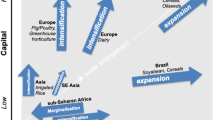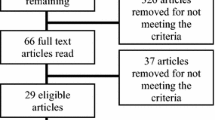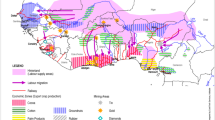Abstract
EurepGAP is a pioneering field level food safety protocol called ‘good agricultural practices’ currently exercising influence over the global food quality assurance system. Developed by a consortium of major European retailers, this private standard enforces codes of conduct that address issues of health and safety for producers and consumers, as well as working conditions and environmental management on the farmland. Despite various merits and benefits that the standard is premised to offer, the institutional design gives a financial edge to powerful large farms and exporters while diminishing opportunities for smaller growers and exporters to remain in the profitable agricultural export sector of the Global South. This paper explores the institutional origin and evolution of EurepGAP, discusses entry barriers and risks that EurepGAP imposes on the global value chain stakeholders, as well as the ethical implications from broader theoretical perspectives. Subsequently, it examines the evolving nature of a new trend in the fresh fruit and vegetable sector, i.e., the rise of public GAP standards. Promoted by some governments in the Global South, these GAP standards emphasize support for horizontal partnerships among value chain stakeholders, farmer participation, and less capital-intensive agricultural innovations. The paper argues that, within certain limitations, these GAP standards have the potential to be the major alternative GAP approach by encouraging a much broader inclusion of small-scale producers towards the attainment of various social, economic, and environmental benefits.

Similar content being viewed by others
Notes
Joint efforts under the global food safety initiative (GFSI) have produced good agricultural practices (GAP), good management practices (GMP), and good distribution practices (GDP). These three basic standards represent a complete food safety assurance system from farm to table (Fulponi 2007).
Production requirements are not necessarily the sole determinant of smallholder exclusion; a concomitant set of supply chain logistics requirements pertains to mainstream retailing, such as product quality, consistent volumes, transportation, processing, accounting, and invoicing (Glati et al. 2007; Reardon and Berdegué 2002).
A standard seeking benchmarked certification must comply with all Control Points and Compliance Criteria as set out in the relevant EUREPGAP standard (EurepGAP 2007).
These countries include: Austria, Chile, Colombia, Germany, Japan, Kenya, Mexico, New Zealand, Spain, Sweden, Switzerland, The Netherlands, Uruguay, and United Kingdom (GlobalGAP 2008a).
These countries include: Brazil, China, Scotland, and Uruguay (GlobalGAP 2008a).
These farmers have about 45,000 dependents (family and wageworker; Graffham et al. 2007).
The 28 crops include 14 fruit crops (banana, coffee, durian, longan, longkong, lychee, mango, mangosteen, pineapple, pummelo, rambutan, tamarind, tangerine, and young coconut). The rest are vegetables (asparagus, baby corn, sweet corn, fresh soybean, groundnut, ginger, chili, okra, rice, vegetables in Family Cruciferae, legumes, capsicum, eggplant, melons and herbs; Surmsuk 2007). Out of them, 12 crop items are being exported. Major importing destinations include EU, China, Hong Kong, Singapore, Japan, USA, and Malaysia (APEC 2006).
References
Altieri, M. A., & Nicholls, C. I. (2005). Agroecology and the search for a truly sustainable agriculture. Mexico D.F.: United Nations Environment Programme.
Asfaw, S. (2007). Does EurepGAP standard marginalize poor farmers? Evidence from Kenya. Entwicklung and Landlicher Raum, 1/2007. Retrieved October 2007, from http://www.rural21.com/uploads/media/ELR_engl_45-47_02.pdf.
Asia Pacific Economic Cooperation (APEC). (2006). Proceeding of the capacity building seminar on good agricultural practices for APEC developing economies. Retrieved October 2008, from http://www.apec.org/apec/enewsletter/mar_vol12/publication.primarycontentparagraph.0002.LinkURL.Download.ver5.1.9.
Athukorala, P.-C., & Jayasuriya, S. (2003). Food safety issues, trade and WTO rules: A developing country perspective. The World Economy, 26(9), 1395–1416.
Bain, C., Deaton, J., & Busch, L. (2005). Reshaping the agri-food system: The role of standards, standard makers and third-party certifiers. In V. Higgins & G. Lawrence (Eds.), Agricultural governance: Globalization and the new politics of regulation (pp. 71–83). London and New York: Routledge.
Barham, E. (2002). Towards a theory of values-based labeling. Agriculture and Human Values, 19, 349–360.
Barrett, H. R., Browne, A. W., Harris, P. J. C., & Cadoret, K. (2002). Organic certification and the UK market: Organic imports from developing countries. Food Policy, 27, 301–318.
Blowers, A. (1997). Environmental policy: Ecological modernisation or the risk society? Urban Studies, 34(5–6), 845–871.
Boselie, D., Henson, S., & Weatherspoon, D. (2003). Supermarket procurement practices in developing countries: Redefining the roles of the public and private sectors. American Journal of Agricultural Economics, 85(5), 1155–1161.
Bredahl, M. E., Northern, J. R., Boecker, A., & Normile, M. (2001). Consumer demand sparks the growth of quality assurance schemes in the European food sector. Washington, DC: Economic Research Service, USDA.
Brown, O. & Sander, C. (2007). Supermarket buying power: Global supply chains and small-scale farmers. Retrieved October 2007, from http://www.tradeknowledgenetwork.net/pdf/tkn_supermarket.pdf.
Burkett, P. (2002). Nature and value: A discussion. Science & Society, 67(4), 452–462.
Busch, L., & Bain, C. (2004). New! Improved? The transformation of the global agrifood system. Rural Sociology, 69(3), 321–346.
Buttel, F. H. (2000). Ecological modernization as social theory. Geoforum, 31, 57–65.
Butterbaugh, K., & Fulton, R. (2008). The WTO primer: Tracing trade’s visible hand through case studies. New York: Palgrave Macmillan.
Campbell, H. (2005). The rise and rise of EurepGAP: The European (re)invention of colonial food relations? International Journal of Sociology of Food and Agriculture, 13(2), 1–19.
Campbell, H., McLeod, C., & Rosin, C. (2006). Auditing sustainability: The impact of EurepGAP. In C. G. Holt & M. Reed (Eds.), Organic agriculture: A sociological perspective (pp. 157–175). Wallingford: CABI Publishing.
Cavalcanti, J. S. B. (2004). New challenges for the players in global agriculture and food. International Journal of Sociology of Food and Agriculture, 12, 29–36.
Charnnarongkul, S. (2007). Latest development of the thai GAP system. Power point presentation presented at the workshop on WTO agreements EU requirements on SPS, TBT and environment 24–25 May 2007, Bangkok. Retrieved April 2008, from http://www.itd.or.th/en/system/files?file=070524-08-day2-presentation.pdf.
Charnovitz, S. (2000). Improving the agreement on sanitary and phytosanitary standards. In G. P. Sampson & W. B. Chambers (Eds.), Trade, environment, and the millennium (pp. 207–233). Tokyo, New York, Paris: United Nations University Press.
Codron, J.-M., Giraud-Héraud, E., & Soler, L.-G. (2005). Minimum quality standards, premium private labels, and European meat and fresh produce retailing. Food Policy, 30, 270–283.
Cohen, M. J. (1997). Risk society and ecological modernisation: Alternative visions for post-industrial nations. Futures, 29(2), 105–119.
Cohen, M. J. (2006). Ecological modernization and its discontents: The American environmental movement’s resistance to an innovation-driven future. Futures, 38, 528–547.
Denise, Y. M., Zylbersztajn, D., Fanina, E. M. M. Q., & Reardon, T. (2005). Determinants of retailers’ decisions to use public and private grades and standards: Evidence from the fresh produce market of São Paulo, Brazil. Food Policy, 30, 334–353.
Dirven, M. (1999). Clustering and declustering effects of globalization: Based on case studies of the milk sector in Chile, Coloumbia, Uruguay, Argentina, and The Netherlands. Nashville, TN: Asociación Americana de Economistas Agrícolas (AAEA).
Dolan, C., & Humphrey, J. (2000). Governance and trade in fresh vegetables: The impact of UK supermarkets on the African horticulture industry. Journal of Development Studies, 37(2), 147–176.
Dolan, C., Humphrey, J., & Harris-Pascal, C. (1999). Horticulture commodity chains: The impact of the UK market on the African fresh vegetable industry. Working paper, 96. The institute of development studies. Retrieved October 2007, from http://www.agribusinessaccountability.org/pdfs/256_Horticultural%20Commodity%20Chains.pdf.
Echols, M. A. (2001). Food safety and the WTO: The interplay of culture, science and technology. London, The Hague, New York: Kluwer Law International.
EurepGAP. (2004). EUREPGAP general regulations guideline fruit and vegetables. Version 2.1-Oct04. Retrieved October 2007, from http://www.aphnet.org/workshop/GAP/International%20GAP/EurepGAP/general_reg_eurepgap_jan04.pdf.
EurepGAP. (2005). EUREPGAP global report 2005. Retrieved October 2007, from http://www.eurep.org/documents/webdocs/E-book-Globalreport.pdf.
EurepGAP. (2007). General regulations integrated farm assurance part I: General information. Version 3.0-1_2July07. Retrieved October 2007, from http://www.eurep.org/fruit/Languages/English/documents.html.
Evans, E. A. (2008). Understanding the WTO sanitary and phtosanitary agreement. The University of Florida IFAS Extension. Retrieved December 2008, from http://edis.ifas.ufl.edu/pdffiles/FE/FE49200.pdf.
Farina, E. M. M. Q., & Reardon, T. (2001). Agrifood grades and standards in the extended mercosur: Their role in the changing agrifood system. American Journal of Agricultural Economics, 82(5), 1170–1176.
Fisher, D., & Freudenburg, W. (2001). Ecological modernization and its critics: Assessing the past and looking toward the future. Society and Natural Resources, 14(8), 701–709.
Food and Agriculture Organization (FAO). (2005). The dynamics of sanitary and technical requirements assisting the poor to cope. FAO Rome: FAO.
Fulponi, L. (2007). The globalization of private standards and the agri-food system. In J. F. M. Swinnen (Ed.), Global supply chains, standards, and the poor: How the globalization of food systems and standards affects rural development and poverty (pp. 5–18). Wallingford, UK: CABI.
Glati, A., Minot, N., Delgado, C., & Bora, S. (2007). Growth in high-value agriculture in Asia and the emergence of vertical links with farmers. In J. F. M. Swinnen (Ed.), Global supply chains, standards, and the poor: How the globalization of food systems and standards affects rural development and poverty (pp. 91–108). Wallingford, UK: CABI.
GlobalGAP. (2007a). EurepGAP now GlobalGAP. Retrieved September 2007, from http://www.globalgap.org/cms/front_content.php?idcat=9&idart=182.
GlobalGAP. (2007b). Control points and compliance criteria, integrated farm assurance. Version 3.0-2_Sep07. Retrieved January 2009, from http://www.globalgap.org/cms/upload/The_Standard/IFA/English/CPCC/GG_EG_IFA_CPCC_INTRO_AF_ENG_V3_0_2_Sep07.pdf.
GlobalGAP. (2008a). Facts and figures. Retrieved September 2007, from http://62.53.192.180/cms/upload/Documents/Folder25_08.pdf.
GlobalGAP. (2008b). GobalGAP perspective. Retrieved February 2009, http://www.commark.org/files/081031_SADC_ECOETZER.pdf.
Graffham, A. (2006). European standards affect African growers. Pesticide news, 71. Developing country initiative. Retrieved September 2007, from http://www.pan-uk.org/Projects/Fairness/PN71/pn71p14.pdf.
Graffham, A., Karehu, E., & MacGregor, J. (2007). Impact of EurepGAP on small-scale vegetable growers in Kenya. Fresh insights. Retrieved October 6, 2007, from http://www.agrifoodstandards.net/en/filemanager/active?fid=83.
Graffham, A., & MacGregor, J. (2007). Impact of EurepGAP on small-scale vegetable growers in Zambia. Fresh insights. Retrieved October 5, 2007, from http://www.agrifoodstandards.net/resources/global/fresh_insights_5_impact_of_eurepgapon_small_scale_vegetable_growers_in_zambia.
Gutman, G. E. (2005). Desregulacion, Apertura Comercial y Reestructuracion Indstrial: La Industria Lactea en Argentina en la Decada de los Noventa. In G. E. Gutman & A. Vispo (Eds.), La desregulacion de los Mercados: Paradigmas e Inequidades de las Politicas del Neoliberalismo. Buenos Aires, SA: Grupo Editorial Norma.
Hatanaka, M., Bain, C., & Busch, L. (2005). Third-party certification in the global agrifood system. Food Policy, 30, 354–369.
Henson, S. J., & Loader, R. J. (2001). Barriers to agricultural exports from developing countries: The role of sanitary and phytosanitary requirements. World Development, 29(1), 85–102.
Henson, S. J., Loader, R. J., Swinbank, A., Bredahl, M., & Lux, N. (2000). Impact of sanitary and phytosanitary measures on developing countries. Reading, Berkshire: Department of Agricultural and Food Economics, The University of Reading.
Henson, S. J., Masakure, O., & Boselie, D. (2005). Private food safety and quality standards for fresh produce exporters: The case of hortico agrisystems, Zimbabwe. Food Policy, 30, 371–384.
Henson, S. J., & Reardon, T. (2005). Private agri-food standards: Implications for food policy and the agri-food system. Food Policy, 30, 241–253.
Hoffman, U. (2007). Experience on developing national GAP programs in Asia and Latin America: A comparative perspective. Paper presented at the FAO-UNCTAD regional workshop on GAP in Eastern and Southern Africa: Practices and policies, Nairobi.
Jahn, G., Schramm, M., & Spiller, A. (2009). Differentiation of certification standards: The trade-off between generality and effectiveness in certification systems. Retrieved October 2007, from http://www.ifama.org/conferences/2004Conference/Papers/Jahn1024.pdf.
Jank, M. S., Farina, E. M. M. Q., & Galan, V. B. (1999). Agribusiness do leite no Brasil. São Paulo: Editora Milkbizz Ltd.
Kilian, B. (2005). Costa rica-GAP case study. Retrieved October 2007, from http://www.unctad.org/trade_env/test1/meetings/inmetro2/CostaRica-GAP%20Case-Study.pdf.
Kleih, U., Ssango, F., Kyazze, F., Graffham, A., & MacGregor, J. (2007). Impact of EurepGAP on small-scale fruit and vegetable growers in Uganda. Fresh insights, 10. Retrieved March 2009, http://www.agrifoodstandards.net/resources/global/fresh_insights_10_impact_of_euregap_on_small_scale_vegetable_growers_in_uganda.
Langhelle, O. (2000). Why ecological modernization and sustainable development should not be conflated. Journal of Environmental Policy & Planning, 2, 303–322.
Löwy, M. (2002). From Marx to Ecosocialism. Capitalism, Nature, Socialism, 13(1), 121–133.
Maertens, M., Dries, L., Dedehouanou, F. A., & Swinnen, J. F. M. (2007). High-value supply chains, food standards and rural households in Senegal. In J. F. M. Swinnen (Ed.), Global supply chains, standards, and the poor: How the globalization of food systems and standards affects rural development and poverty (pp. 159–172). Wallingford, UK: CABI.
Martinez, M. G., & Poole, N. (2004). The development of private fresh produce safety standards: Implications for developing Mediterranean exporting countries. Food Policy, 29, 229–255.
Mausch, K., Mithöfer, D., Asfaw, S., & Waibel, H. (2006). Impact of EurepGAP standard in Kenya: Comparing smallholders to large-scale vegetable producers. Paper presented at the conference on international agricultural research for development, University of Bonn.
Minton, B., Randrianarison, L., & Swinnen, J. F. M. (2007). Global supply chains, poverty and the environment: Evidence from Madagascar. In J. F. M. Swinnen (Ed.), Global supply chains, standards, and the poor: How the globalization of food systems and standards affects rural development and poverty (pp. 147–157). Wallingford, UK: CABI.
Mol, A. P. J., & Sonnenfeld, D. A. (2000). Ecological modernization around the world: An introduction. Environmental Politics, 9(1), 3–16.
Mungai, N. (2004). EU rules could destroy horticulture: The protocol on good agricultural practices will have a profound impact on both large and small-scale farmers, alhough the biggest impact will be on the latter. Daily nation, Nairobi, 7 May 2004 (p. 11). Retrieved October 2007, from http://www.fintrac.com/docs/kenya/05_07_04_EU_rules.pdf.
Murphy, G. A. (2000). Editorial. Geoforum, 31, 1–8.
Murray, D. L., & Raynolds, L. (2000). Alternative trade in bananas: Obstacles and opportunities for progressive social change in the global economy. Agriculture and Human Values, 17, 65–74.
O’Connor, J. (1998). Natural causes. New York: Guilford.
Okello, J. J., & Swinton, S. M. (2007). Compliance with international food safety standards in Kenya’s green bean industry: Comparison of a small- and a large-scale farm producing for export. Review of Agricultural Economics, 29(2), 269–285.
Organisation for Economic Co-operation and Development (OECD). (2003). The impact of regulations on agro-food trade: The technical barriers to trade (TBT) and sanitary and phytosanitary measures (SPS) agreements. Paris, France: OECD.
Otsuki, T., Sewadesh, M., & Wilson, J. S. (2001). Saving two in a billion: Quantifying the trade effect of European food safety standards on African exports. Food Policy, 26, 495–514.
Poulton, C., Dorward, A., & Kydd, J. (1998). The revival of smallholder cash crops in Africa: Public and private riles in the provision of finance. Journal of International Development, 10(1), 85–103.
Rapley, J. (2002). Understanding development: Theory and practice in the third world. Boulder, London: Lynne Rienner Publishers.
Reardon, T., & Berdegué, J. A. (2002). The rapid rise of supermarkets in Latin America: Challenges and opportunities for development. Development Policy Review, 20(4), 371–388.
Rosset, P. M., & Altieri, M. A. (1997). Agroecology versus input substitution: A fundamental contradiction of sustainable agriculture. Society & Natural Resources, 10(3), 283–295.
Schuh, G. E. (2000). Historical and social science perspectives on the role of risk assessment and science in protecting the domestic economy: Some background. In Board on Agriculture and Natural Resources, National Research Council (Ed.), Incorporating science, economics, and sociology in developing sanitary and phytosanitary standards in international trade (pp. 23–30). Washington, D. C.: National Academy Press.
Silverglade, B. A. (2000). The WTO agreement on sanitary and phytosanitary measures: Weakening food safety regulations to facilitate trade? Food and Drug Law Journal, 55, 517–524.
Singh, B. P. (2001). Nontraditional crop production in Africa for export. In J. Janick, A. Whispkey, & A. Whispkey (Eds.), Trends in new crops and new uses (pp. 86–92). Alexandria, VA: ASHS Press.
Surmsuk, S. (2007). Quality management system: Good agricultural practice (GAP) for on-farm production in Thailand. Food & Fertilizer Technology Center. Retrieved October 2007, from http://www.unapcaem.org/Activities%20Files/A22/p79_QualityMgr.pdf.
Temu, A. E., & Marwa, N. W. (2007). Changes in the governance of global value chains of fresh fruits and vegetables: Opportunities and challenges for producers in sub-Saharan Africa. Geneva: South Centre.
Unnevehr, L. (2000). Food safety issues and fresh food product exports from LDCs. Agricultural Economics, 23, 231–240.
van der Meer, C. L. J. (2006). Exclusion of smallholder producers from coordinated supply chains: Market failure, policy failure or just economies of scale? In R. Ruben, M. Slingerland, & H. Nijhoff (Eds.), Agro-food chains and networks for development (pp. 209–217). Netherlands: Springer.
Wallis, V. (2001). Toward ecological socialism. Capitalism, Nature, Socialism, 12(1), 127–145.
Weatherspoon, D. D., & Reardon, T. (2003). The rise of supermarkets in Africa: Implications for agrifood systems and the rural poor. Development Policy Review, 21(3), 333–355.
York, R. (2004). The treadmill of (diversifying) production. Organization & Environment, 17(3), 355–362.
Author information
Authors and Affiliations
Corresponding author
Rights and permissions
About this article
Cite this article
Amekawa, Y. Reflections on the Growing Influence of Good Agricultural Practices in the Global South. J Agric Environ Ethics 22, 531–557 (2009). https://doi.org/10.1007/s10806-009-9171-8
Accepted:
Published:
Issue Date:
DOI: https://doi.org/10.1007/s10806-009-9171-8




